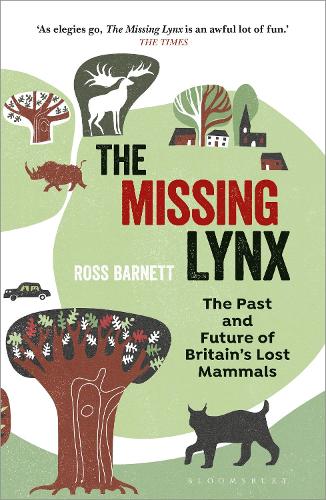
The Missing Lynx: The Past and Future of Britain's Lost Mammals
Publishing Details
The Missing Lynx: The Past and Future of Britain's Lost Mammals
By (Author) Ross Barnett
Bloomsbury Publishing PLC
Bloomsbury Wildlife
1st September 2020
23rd July 2020
United Kingdom
Classifications
General
Non Fiction
Endangered species and extinction of species
591.680941
Physical Properties
352
Width 128mm, Height 196mm, Spine 24mm
289g
Description
Britain's lynx are missing, and they have been for more than a thousand years. Why have they gone And might they come back
Britain was a very different place 15,000 years ago home to lions, lynx, bears, wolves, bison and many more megafauna. But as its climate changed and human populations expanded, most of early Britain's largest mammals disappeared. Will advances in science and technology mean that we can one day bring these mammals back And should we
In The Missing Lynx, palaeontologist Ross Barnett uses case studies, new fossil discoveries and biomolecular evidence to paint a picture of these lost species and to explore the ecological significance of their disappearance. He discusses how the Britons these animals shared their lives with might have viewed them and investigates why some species survived while others vanished.
Barnett also looks in detail at the realistic potential of reintroductions, rewilding and even of resurrection in Britain and overseas, from the successful return of beavers in Argyll to the revolutionary Pleistocene Park in Siberia, which has already seen progress in the revival of 'mammoth steppe' grassland.
As widespread habitat destruction, climate change and an ever-growing human population lead us inexorably towards the sixth extinction, this timely book explores the spaces that extinction has left unfilled. And by helping us to understand why some of our most charismatic animals are gone, Ross Barnett encourages us to look to a brighter future, one that might see these missing beasts returned to the land on which they once lived and died.
Reviews
As elegies go, The Missing Lynx is an awful lot of fun. -- Tom Chivers * The Times *
Rewilding is certainly romantic but is it practical or even desirable It all needs thinking through, and Barnett, who makes a compelling case in favour of the idea, can help. -- Stuart Blackman * BBC Wildlife *
The Missing Lynx is a joyous rabbit-hole to venture down. -- Jacob Dykes * Geographical *
Barnett's writing is clear and unobtrusively witty ... And the book is full of cheery, Terry Pratchett-esque footnotes. -- Tom Chivers * The Times *
Fresh and assured ... An often moving tribute to lost marvels. -- Barbara Kiser * Nature *
A cracking read and rather heartbreaking to think about all those megafauna we pushed over the edge. Highly recommended! -- Professor Paul Barrett * @NHMdinolab *
In short, I absolutely loved this book. It weaves together stories of incredible natural history (the amazing ways in which species live or lived), cutting-edge scientific research, and tales from museum storerooms, as well as positive insight into environmental conservation.
Never have I seen footnotes so well utilised to add real story, detail and humour.
His writing is full of admiration for the resourcefulness of Palaeolithic tribespeople his descriptions of an Ice Age economy that ran on mammoths, and of the mammoth hunts themselves, are evocative. -- Tom Chivers * The Times *
The Missing Lynx is one of those rare popular science books that manages to serve up a hearty plate of captivating science with a delicious side of escapism. -- Dr Emma Dunne * The Palaeontological Association *
A wonderful and haunting book: so rich in detail that the mammals of Britain's past seem brought to life again, and yet so unflinching in its portrayal of the brute facts of extinction that readers will ache for all that has been lost. -- Tom Holland, author and historian
With his fast-paced and amusing tales of some of the most awe-inspiring species lost within geologically recent times, The Missing Lynx brings Britain's Ice Age back to life. -- Professor Beth Shapiro, author of How to Clone a Mammoth
A fascinating account of the large herbivores and predators that have disappeared from Britain since humans reached our islands. This should be essential reading for those who advocate rewilding. -- Professor Richard Fortey, palaeontologist and author
The story of Britain's Ice Age bestiary, told with bittersweet humour, and a clarion call to us all to step up and fight future extinctions. -- Dr Victoria Herridge, evolutionary biologist and presenter
Barnett's writing is clear and accessible, and often amusing. -- Megan Shersby * BBC Countryfile *
The Missing Lynx, with its copious amounts of information about the lives and extinctions of its subject, leavened with sufficiently frequent witticisms, flippant off-hand remarks, and bits of gallows humor to make such serious subjects sufficiently psychologically palatable so as to allow them to sink in to the minds of its readers and be remembered ... It is most whole-heartedly an enthusiastically recommended to all. -- Johannes E. Riutta * The Well-read Naturalist *
The Missing Lynx is a fascinating publication by a specialist in analysing and interpreting ancient DNA. Packed full of scientific data and detail of fossil discoveries it is written with great humour, even cunningly weaving in snatches from literature and film. -- Professor Keith Somerville * talkinghumanities *
Author Bio
Ross Barnett is a palaeontologist with a PhD in Zoology from the University of Oxford. He specialises in seeking, analysing and interpreting ancient DNA, but his area of expertise is the genetics and phylogeny of cats, especially extinct sabretooths. Barnett's research has led to many remarkable findings in recent years and involved investigating escaped lynx in Edwardian Devon, rubbishing claims that the yeti is an ice-age polar bear and seeking the ancestral home of the enigmatic Orkney vole. In 2018, he received the Palaeontological Association's Gertrude Elles Award for Public Engagement. Ross lives in the Highlands of Scotland with his wife and two daughters.
